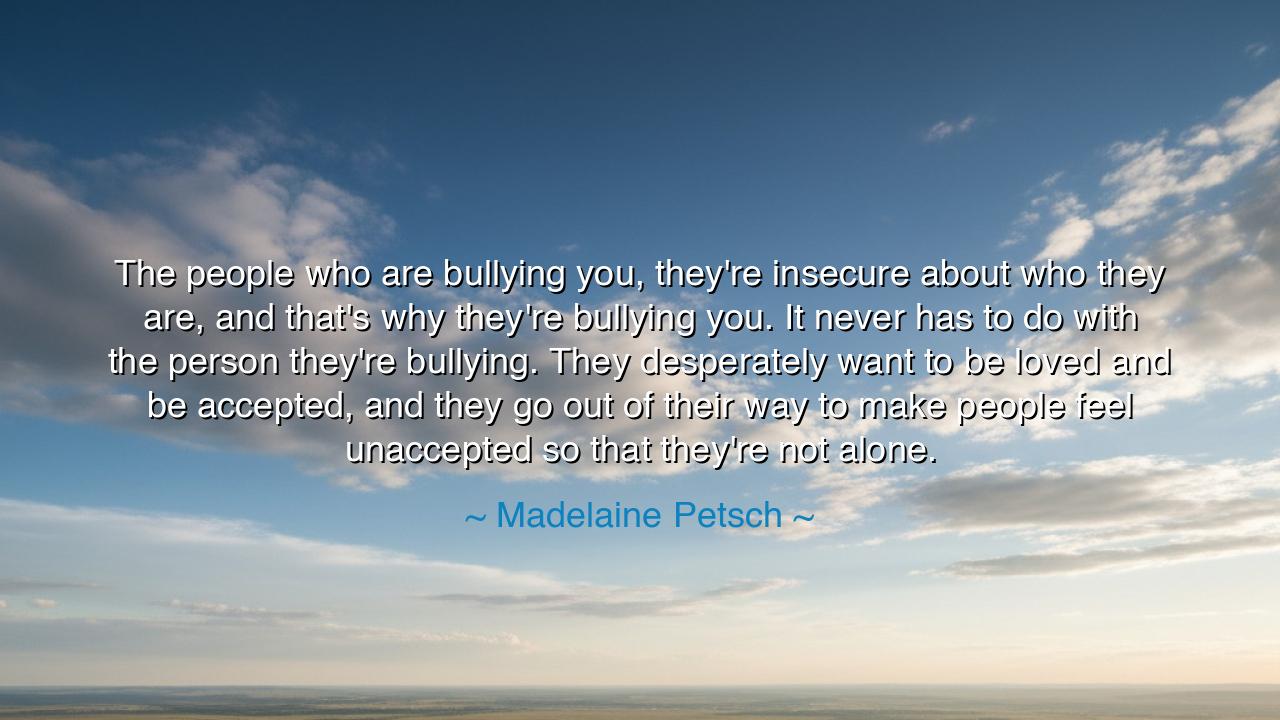
The people who are bullying you, they're insecure about who they
The people who are bullying you, they're insecure about who they are, and that's why they're bullying you. It never has to do with the person they're bullying. They desperately want to be loved and be accepted, and they go out of their way to make people feel unaccepted so that they're not alone.






"The people who are bullying you, they're insecure about who they are, and that's why they're bullying you. It never has to do with the person they're bullying. They desperately want to be loved and be accepted, and they go out of their way to make people feel unaccepted so that they're not alone." These words from Madelaine Petsch unveil the deep truth about the dynamics of bullying and the insecurities that drive such behaviors. The essence of her statement lies in recognizing that bullying is not a reflection of the victim but rather of the bully’s own struggles with self-worth. To bully someone is to project one’s own fears and weaknesses onto others, to use another's vulnerability as a shield against their own fears of rejection and isolation. This insight cuts to the heart of what it means to be human: we all seek acceptance, but not all know how to earn it through compassion and kindness.
In the ancient world, the idea that insecurity and fear lie behind harmful actions was well understood. The Greek philosophers spoke often of the human struggle between virtue and vice—the latter often emerging as a response to inner conflict. Aristotle believed that humans, by nature, are driven by a desire for happiness, but that happiness can often be blocked by ignorance, fear, and pride. For the bully, happiness is not found in kindness or integrity but in the temporary validation that comes from making others feel small. This deep-seated fear of being unloved and unaccepted can create an emptiness in the heart, one that the bully attempts to fill by tearing others down.
Consider the story of Caius Caligula, the Roman emperor, whose tyrannical reign was marked by cruelty toward those who crossed him. It is said that Caligula’s fear of losing his power and his self-doubt led him to humiliate and punish anyone who dared challenge his authority. His actions were not a reflection of the victims’ worth but of his own insecurity and desperate need to assert his dominance. Like the bully in Petsch’s quote, Caligula sought to make others feel unaccepted and insignificant to shield himself from the vulnerability he felt within. His cruelty, born of fear, led to his eventual downfall, demonstrating how unchecked insecurity can manifest in destructive ways.
This deeper understanding of bullying calls us to examine the human condition—our need to belong and feel accepted. Throughout history, we see that those who hurt others most often do so because they are struggling with their own sense of self. They lash out, attempting to build themselves up by tearing others down, but in doing so, they only perpetuate their loneliness and their fears of rejection. This is why, as Petsch suggests, the person being bullied is never the true target—it is the bully who is really crying out for love and connection, even if their actions are harmful and misguided.
Think of Nelson Mandela, who spent 27 years imprisoned by a system that sought to diminish his dignity. While the apartheid regime sought to oppress and humiliate him, Mandela never succumbed to hatred or bitterness. Instead, he recognized that those who oppressed him were themselves victims of a society built on fear, insecurity, and hate. His response to oppression was not retaliation but forgiveness and a commitment to reconciliation. Mandela’s ability to rise above the behavior of his oppressors demonstrates the power of understanding that the actions of others often reflect their insecurities, not our worth.
The lesson from Petsch’s words is one of compassion and understanding. When we are confronted with the harsh words or actions of others, it is essential to remember that their behavior often speaks more about their own inner turmoil than about us. By recognizing that those who seek to bring others down are often grappling with their own insecurities, we can choose empathy over anger and forgiveness over resentment. This awareness allows us to rise above the hurtful behavior of others and move forward with dignity and strength.
In practical terms, this means that when we are faced with bullying or hurtful words, we must remind ourselves that the problem lies within the bully, not with us. Instead of engaging with their cruelty, we must choose to focus on our own self-worth, to surround ourselves with people who support and uplift us. By choosing kindness, even in the face of hostility, we break the cycle of hurt and create space for healing. Petsch's words challenge us to see bullying not as a reflection of our inferiority, but as a cry for acceptance from those who, deep down, are still seeking love and validation.
Finally, let us remember that true strength lies not in retaliating or seeking revenge, but in responding to insecurity with compassion. By recognizing that the person who bullies is often fighting their own battles, we can choose to be a force of healing and love, breaking the cycle of cruelty and building a future where acceptance and understanding prevail.






AAdministratorAdministrator
Welcome, honored guests. Please leave a comment, we will respond soon